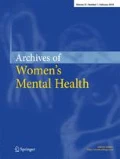Abstract
Self-compassion is associated with depression and anxiety in general samples. Although recent research indicates that dysfunctional maternal attitudes predict the development of perinatal depression and anxiety symptoms, no research to date has examined the construct of self-compassion and its relationship with psychological well-being in perinatal women. Pregnant and postpartum women (N = 189) completed self-report measures of depression and anxiety history, current depression and anxiety symptom severity, and self-compassion. Women with higher depression and anxiety symptom severity had significantly lower self-compassion. Additionally, women with self-reported prior history of depression or anxiety had significantly lower self-compassion even while controlling for current depression or anxiety symptom severity, respectively. Our results suggest that self-compassion warrants further attention in the study of the development, maintenance, and treatment of perinatal mood and anxiety disorders.
References
Blatt SJ, Quinlan DM, Pilkonis PA, Shea MT (1995) Impact of perfectionism and need for approval on the brief treatment of depression—the National Institute of Mental-Health Treatment of Depression Collaborative Research-Program Revisited. J Consult Clin Psychol 63(3):494–494. doi:10.1037//0022-006x.63.3.494
Goodman J, Chenausky K (2014) CALM pregnancy: results of a pilot study of mindfulness-based cognitive therapy for perinatal anxiety. Nurs Res 63(2):E61–E61
Hamilton KE, Dobson KS (2002) Cognitive therapy of depression: pretreatment patient predictors of outcome. Clin Psychol Rev 22(6):875–893
Kuyken W, Watkins E, Holden E, White K, Taylor R, Byford S, Evans A, Radford S, Teasdale J, Dalgleish T (2010) How does mindfulness-based cognitive therapy work? Behav Res Ther 48(11):1105–1112
Martini J, Petzoldt J, Einsle F, Beesdo-Baum K, Hofler M, Wittchen HU (2015) Risk factors and course patterns of anxiety and depressive disorders during pregnancy and after delivery: a prospective-longitudinal study. J Affect Disord 175:385–395. doi:10.1016/j.jad.2015.01.012
Neff KD, Kirkpatrick KL, Rude SS (2007) Self-compassion and adaptive psychological functioning. J Res Pers 41(1):139–154. doi:10.1016/j.jrp.2006.03.004
O’Hara MW, Swain AM (1996) Rates and risk of postpartum depression—a meta-analysis. Int Rev Psychiatry 8(1):37–54
Perez-Blasco J, Viguer P, Rodrigo MF (2013) Effects of a mindfulness-based intervention on psychological distress, well-being, and maternal self-efficacy in breast-feeding mothers: results of a pilot study. Arch Womens Ment Health 16(3):227–236. doi:10.1007/s00737-013-0337-z
Sockol LE, Battle CL (2015) Maternal attitudes, depression, and anxiety in pregnant and postpartum multiparous women. Arch Womens Ment Health. doi:10.1007/s00737-015-0511-6
Tluczek A, Henriques JB, Brown RL (2009) Support for the reliability and validity of a six-item state anxiety scale derived from the State-Trait Anxiety Inventory. J Nurs Meas 17(1):19–28
Williams MJ, Dalgleish T, Karl A, Kuyken W (2014) Examining the factor structures of the five facet mindfulness questionnaire and the self-compassion scale. Psychol Assess 26(2):407–418. doi:10.1037/a0035566
Acknowledgments
We acknowledge funding by a University of Colorado Boulder Beverly Sears Graduate Student Grant (PI: Felder). We would also like to acknowledge the important work of clinic staff including Gina Wolf, as well as study team members including Alison Conner and Chelsea Neely-Holt.
Author information
Authors and Affiliations
Corresponding author
Rights and permissions
About this article
Cite this article
Felder, J.N., Lemon, E., Shea, K. et al. Role of self-compassion in psychological well-being among perinatal women. Arch Womens Ment Health 19, 687–690 (2016). https://doi.org/10.1007/s00737-016-0628-2
Received:
Accepted:
Published:
Issue Date:
DOI: https://doi.org/10.1007/s00737-016-0628-2

